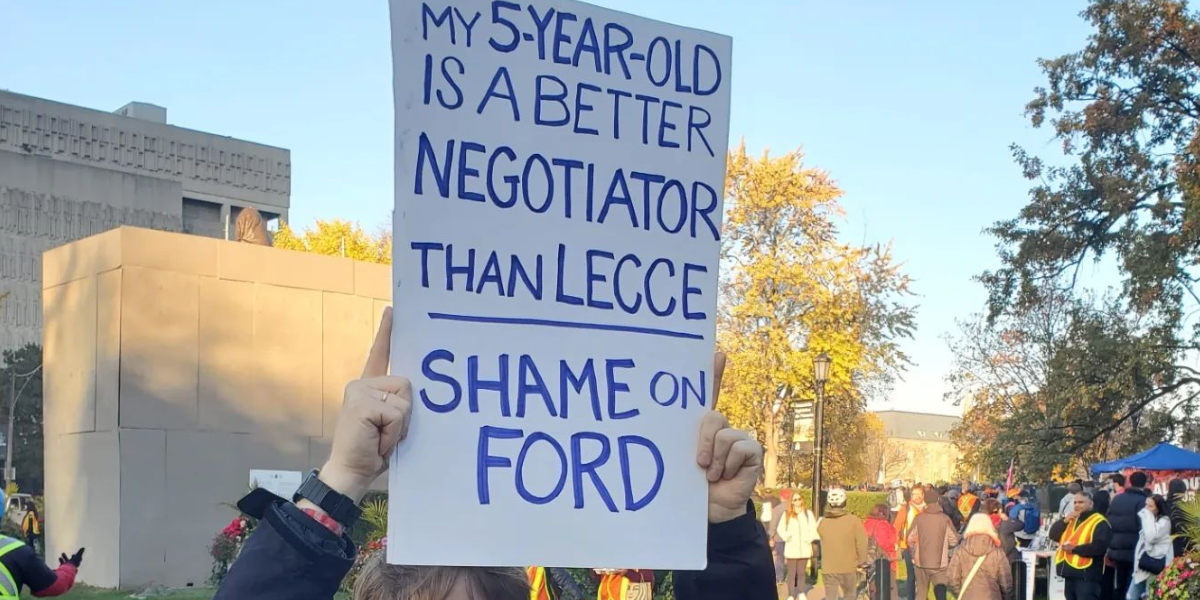Ontario’s Catholic teachers have ratified a tentative contract deal with the province, covering the next three years. On March 27, the Ontario English Catholic Teachers’ Association (OECTA) announced that they had ratified an agreement on central terms for a new contract, while wages would go to an arbitrator. OECTA was the last of the four major teachers’ unions to reach a deal with the government, coming after more than 18 months of talks.
Ontario Education Minister Stephen Lecce said the structure of the tentative deal is similar to those agreed to with the other teachers’ unions, salary and other outstanding matters would be resolved through binding arbitration.
Ford’s peace and stability
Lecce was quick to brag about delivering “peace and stability” to Ontario students and families. OECTA, like the other teachers unions, had high strike votes from their members and clearly benefited from the lead taken by education workers in autumn 2022. Represented by CUPE’s OSBCU and led by president Laura Walton, their systematic approach to engaging, organizing, and mobilizing their members produced a record-breaking strike mandate vote in early October: 96.5 per cent in favour with an 83% turnout, while community solidarity and helped build support for their fight against the Ontario government. Doug Ford attempted to use anti-worker legislation that was so unprecedented and severe that it provoked union solidarity across the country and the credible threat of a general strike, which forced the government to back down in a big way.
In this context, it is clear that the Ford government with its promises of “stability for students and families” was determined to avoid any labour disruptions in school. Their bargaining reflected this as well. They were delighted that Secondary School Teachers (OSSTF) agreed to binding arbitration, and hoped others would follow suit, but in the end accepted a deal with English Elementary Teachers (ETFO) without any wage or benefit cuts and this OECTA deal is almost identically structured according to union officials.
Missed opportunity
In hindsight, we can see that all education unions across the province could have gotten a lot more than we did. This government was keen to avoid any type of labour disruption in schools and if education unions had even a little bit of politics and rank-and-file organization, we could have won changes to working conditions and more supports for classroom. As it stands, we are poised to make some modest gains in wages, stay firm on pension and benefits, but per-student funding, the conditions of the job and the staffing shortages are all set to stay the same or get worse.
The government has succeeded in maintaining labour peace and pushing the crisis in Ontario Education a little further down the road. We can’t let the job get any harder. There is already an exodus from the profession that makes it hard to fill jobs with qualified teachers and all boards are hemorrhaging Educational Assistants as job postings remain unfilled for months.
Rebuild rank and file organization
We need to look for ways in which we can organize our co-workers around “shop-floor” issues (violence in classrooms, for example), collaborate with other schools and workers in other boards to try and create links and share resources to build our rank-and-file power. We need to be able to push leadership to do the right thing and act independently when they don’t.
This agreement, like the ETFO deal, will give teachers three years to try and build the solidarity and organization that so scared Doug Ford in 2022. Building rank-and-file networks of education workers with this perspective will be essential to break the impasse.
Did you like this article? Help us produce more like it by donating $1, $2, or $5. Donate

